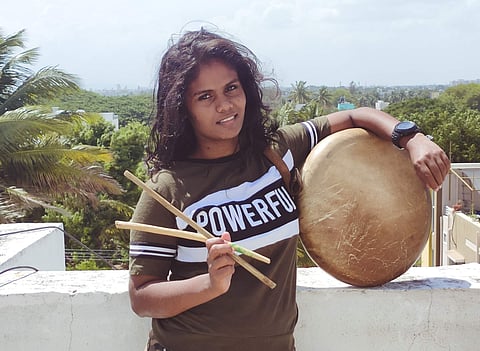
- News
- Campus
- Exam
- Podcast
- Web Stories
- Do You Know
- Path Finders - UG Programs
- Videos
- Élitscape

Before a street play can begin, the artist needs to draw the attention of the audience around them. To do so, they need to make an impact, a loud one at that. For Chandrika Srinivas, this loud impact was the parai, an ancient musical instrument from Tamil Nadu. A street play and theatre artist, it was one of Chandrika's mentors who gave her the idea to use the parai to draw attention. "It has an attractive sound and it is quite loud," says the 25-year-old. And that's how Chandrika's affair with the parai began some six years ago.
Today, Chandrika and three others — Srinivas, Suresh and Sathis — run a school called Nigar Kalaikoodam in Coimbatore on Sunday where they teach the instrument to people as young as eight. "I took a year to learn the instrument and from the second year of learning, I began teaching others," says Chandrika. The Organic Chemistry PhD scholar from Bharathiar University conducts classes every Sunday. "Due to the pandemic, we are now conducting these classes online. Although it is not as immersive as an offline class, we are managing fine so far," adds Chandrika.
Besides an aim to popularise the instrument, Chandrika also wants to remove the stigma surrounding the instrument. "Parai is a percussion instrument that has been played for all important occasions since ancient times but over the last few centuries, it is only played during funerals. This has led it to becoming an instrument of mourning and therefore, a lot of people aren't eager to learn it. This is why such instruments are becoming extinct," explains Chandrika.
And that's not all. This has led to a concerning lack of women parai players as well. "Since it has become an instrument that's played in the funeral, women don't take it up at all," says Chandrika, adding, "When I began playing, I was among a handful of women who knew how to play this instrument. But I can gladly say that 50 per cent of my class today consists of female students." Over the last four or five years, Chandrika has managed to train around 400 people to play the parai.
In the future, Chandrika plans to take the parai to every school in the state. "We want to include the parai as part of a school's music lessons and make it as popular as guitar or piano. Parents are encouraging when their children want to learn these Western instruments but no so much when it comes to instruments like the parai. We would like to change that," states Chandrika.
